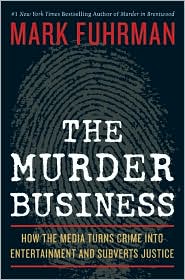HT PJM
News Without Reporters
March 23, 2008 12:15 AM
Reporters are a dying breed, says Steve Boriss, and that’s a good thing. America got along fine without them once before.
by Steve Boriss
One of journalists’ recurring put-downs of bloggers is that they are simply recycling someone else’s news — that there will always be a need for reporters to produce it. Yet, America had a reporterless past and will likely have a reporterless future. And, news will be better for it.
We have lost perspective on what a reporter actually is — a middleman. On one side are news events. On the other are audiences who want to know about them. A reporter’s job is to move “the truth” from Point A to Point B as accurately as possible.
This middleman function, with reporters serving as mere links in a news supply chain, was never needed until fairly recently. Before the printing press was invented, we were all receivers and transmitters of news, spreading it by word-of-mouth. Soon after its invention, multitudes of mostly one-man print-shops, as a sideline, printed newspapers to supplement this word-of-mouth process. These printers wrote their own articles blending facts with opinion, much like bloggers do today. Others also contributed, often without receiving compensation or attribution — citizens, gossips, letter-writing “correspondents” from other towns, and similarly-operating foreign and domestic newspapers whose stories were simply lifted.
Since this is what news looked like at the time of the Founding Fathers, they gave no particular mandate to reporters, a function that did not even exist at the time. The “freedom of the press” they cited in the First Amendment was not about “the press,” but about everyone’s right to freely use a printing press to express their views without government interference, supplementing the free speech clause that allowed everyone to express their views orally.
The first full-time reporter in America did not appear until the 1820’s, after steam engines were integrated into printing presses. Suddenly, newspapers had to be run like businesses to achieve consistently high circulation levels to pay for equipment and keep newsstand prices low. Reporters provided the needed constant flow of consistently well-written articles.
For the first century of their existence, the public had a realistic view of what full-time reporters actually did and awarded them the appropriate, low level of status. Legendary editor Walter Lippmann wrote in 1919 that “reporting is not a dignified profession for which men will invest the time and cost of an education, but an underpaid, insecure, anonymous form of drudgery, conducted on catch-as-catch-can principles.”
But Lippmann was also determined to turn reporting into a profession. He urged us to “make up our minds to send out into reporting a generation of men who will by sheer superiority, drive the incompetents out of business” to be replaced by “patient and fearless men of science who have labored to see what the world really is.” He called for “professional training in journalism in which the ideal of objective testimony is cardinal” with reporters conducting “as impartial an investigation of the facts as is humanly possible.”
But at the same time Lippmann created a puffed-up image of reporters that has lasted for decades, he was planting the seeds of the role’s destruction. Despite their self-image as objective professionals, reporters have yet to create methodologies to back-up their claims. This is painfully obvious in the book The Elements of Journalism, the closest thing there is to journalism scripture, which shrugs-off an admission that every reporter has his own methodology for verifying facts. Now with alternative, challenging voices from cable TV, talk radio, and the blogosphere, the public increasingly understands that reporters are often biased and inaccurate, just like the rest of us. We are also relearning what Thomas Jefferson intuitively understood — the truth is more likely to emerge from a multitude of voices competing in a freewheeling marketplace of ideas than from elites offering their views of the truth drawn from their own limited knowledge and perspectives.
Now, the Internet is eliminating the reporter as middleman by connecting audiences directly with the real sources of news — politicians’ offices, PR firms, whistleblowers, think tanks, courts, police departments, and everyone else with a news ax to grind. These entities have always been capable of writing their own stories in a usable form, but have previously needed reporters to get their stories distributed. Nor will we miss investigative reporters, who had always been dangerously untrained in the skills needed to do their job properly (e.g. forensics, law) and often unfairly destroyed the reputations of innocents. Society has many alternative, more responsible ways to right wrongs, and the blogosphere can easily fill this void.
We will continue to have news middlemen, but those that survive must create real value for their audiences. Editors can create value by aggregating, analyzing, adding opinions, and gathering like-minded audiences for advertisers. Bloggers do the same. But, reporters are repeaters. They, not bloggers, are unnecessary recyclers of news.
Steve Boriss blogs at The Future of News. He works for Washington University in St. Louis, where he is Associate Director of the Center for the Application of Information Technology (CAIT) and teaches a class called “The Future of News.”


